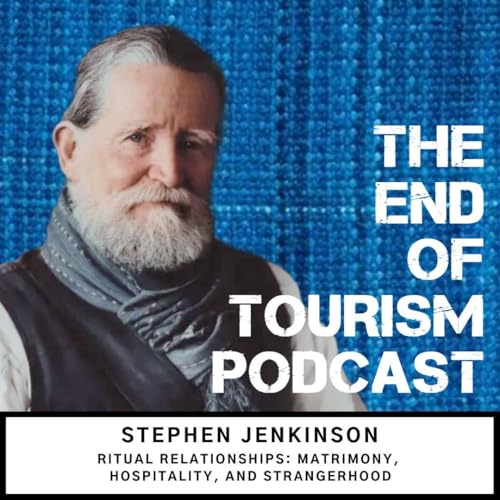Mi huesped en este episodio es Claude Guislain, un antropólogo peruano que pasa la mayor parte de su tiempo con pueblos indígenas en Perú, Colombia y Brasil. Con su primera investigación sobre el uso de la ayahuasca y el chamanismo por parte de los occidentales en Iquitos (2005-2007), inició el viaje que lo llevó a dedicar su vida a tender un puente entre la sabiduría indígena y el mundo moderno. A lo largo de más de quince años dedicados casi exclusivamente a apoyar tanto a curanderos indígenas como a pacientes y exploradores occidentales, ha estado al servicio de los procesos de curación de cientos de personas. Ha estado trabajando y formándose con los Shipibo desde 2013, ayudando a la familia López a construir su propio centro. Fue facilitador y asesor en relaciones indígenas en el Templo del Camino de la Luz (2015-2023). Trabaja y aprende con un mamo Arhuaco desde 2012, con un Jaguar del yurupari del Tubú desde 2016 y con el pueblo Yawanawa de Brasil desde 2018.Hoy es asesor y miembro del Comité Técnico del Fondo de Conservación de Medicinas Indígenas y colabora también con ICEERS, y otras organizaciones, inspirándolas y ayudándolas a tejer sus esfuerzos y dones con los procesos indígenas de base.Notas del Episodio* La historia y esperanza de Claude* La idealizacion de los pueblos indigenas* El renacimiento psicodelico* Curacion y cantos* Contradicciones en el turismo psicodelico* La deforestacion, la demanda y la continuidad del conocimiento* Conservacion biocultural* ICEERS & MSCTareaClaude Guislain - Facebook - InstagramIndigenous Medicine Conservation FundInternational Center for Ethnobotanical Education, Research and ServiceTranscripcion en Espanol (English Below)Chris: Bienvenido Claude, al podcast El Fin del Turismo.Claude: Chris. Muchas gracias.Chris: Me gustaría saber si podrías explicar un poco de dónde te encuentras hoy y cómo el mundo aparece para ti?Claude: Buena pregunta. Estoy, ahora mismo estoy en Rio de Janeiro, donde vivo. Soy peruano y también estudié antropología y dedico mucho mi tiempo a los pueblos indígenas, sobre todo en Brasil, en Colombia y en Perú y he estado trabajando en las Amazonas durante muchos años. Y como veo el mundo hoy, desde aquí, pues con mucha preocupación, evidentemente, pero también por lo que hago con alguna esperanza, Chris: Yeah y pues en esa cuestión de lo que haces y de lo que hemos hablado antes, parece que es un gran camino, un camino de ya [00:01:00] décadas y décadas. Y me gustaría, si podemos viendo un un poco más de ese camino. Podrías comentar un poco de cómo llegaste en este gran momento sea por tus viajes, a otros países, a otros mundos, a otros maestros y maestras. Claude: Sí, claro, a ver cómo te explico. Llevo unos 20 años trabajando con lo indigena en general, pero sobre todo con el tema de espiritualidad, plantas maestras como la ayahuasca y esas cosas, y llegue ahí como, creo que, como la mayoría de personas que hoy en día llegan ahí a la selva, o a buscar estas medicinas como se les llaman, que es una, una cierta o una profunda insatisfacción por nuestra propia cultura, por la respuesta que nuestra propia sociedad [00:02:00] nos puede dar existenciales, diría yo. Es como siempre hay una pregunta que uno se dice, "No tiene que haber algo más. No puede ser eso solamente." Esa propuesta, digamos de occidente, no puede ser solamente eso, debe haber algo más, verdad? Entonces eso me embarcó a mí en una búsqueda desde, no sé cuando tenía por ahí unos veinti, veinti y pocos años.Que me llevó a experimentar estas medicinas como la ayahuasca, el San Pedro, los hongos, no por una cosa lúdica, ni ni evasiva, sino por el contrario, con una curiosidad por otras formas de saber y conocer, . Entonces yo me acerqué a estas medicinas, con curiosidad de entender cómo los pueblos indígenas saben lo que saben. Cuál es el origen de su [00:03:00] conocimimomento verdad?Entonces, estudié antropología. Me alejé de la academia rápidamente porque, me pareció mucho más interesante lo que me enseñaban los abuelos que para la antropología eran mis informantes, verdad? Era como, tenía que a mi informante tal, el informante tal. Y me di cuenta que no, que no eran mis informantes, sino que eran maestros y aprendía mucho más con ellos que lo que me enseñaba los libros, o las clases, o los seminarios, verdad?Entonces decidí mas dedicarme a seguirlos a ellos y a seguir aprendiendo con ellos, y ver de qué manera los podía ayudar a ellos. Estos abuelos, estos sabios indígenas. Y eso me llevó a un camino maravilloso de que hoy en día le llamo "la gente puente," no? O sea, gente que estamos en ese lugar de interface, entre el conocimimomento, la sabiduría que nos queda de los pueblos [00:04:00] indígenas y el mundo occidental, el mundo moderno. Y en ese nuevo tipo de encuentro que está surgiendo hace una década o tal vez dos décadas. Es este nuevo tipo de encuentro de nuestros ...
Más
Menos
 Jan 21 20261 h y 28 m
Jan 21 20261 h y 28 m Jan 15 20266 m
Jan 15 20266 m Sep 23 20251 h y 49 m
Sep 23 20251 h y 49 m 57 m
57 m Jun 17 20251 h y 4 m
Jun 17 20251 h y 4 m 1 h y 10 m
1 h y 10 m 1 h y 2 m
1 h y 2 m 1 h y 9 m
1 h y 9 m
